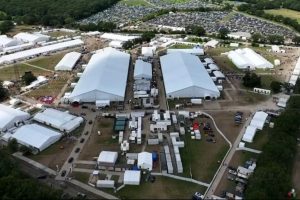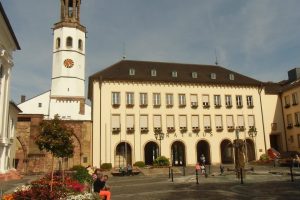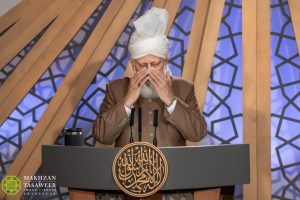After reciting Tashahhud, Ta‘awwuz and Surah al-Fatihah, His Holiness, Hazrat Mirza Masroor Ahmad (aba) said that from today, the Jalsa Salana Qadian has begun. His Holiness (aba) also stated that about seven to eight African countries are also holding their Jalsa Salana. His Holiness (aba) said that he would address the Jalsa Salana Qadian from the UK, and that the participating African countries may be made part of this address through MTA.

The Reason for Establishing the Ahmadiyya Muslim Community
His Holiness (aba) stated that he would present teachings of the Promised Messiah (as) in which he mentions the purpose of his advent and the responsibilities of his community. Many new Ahmadis will be participating in these Jalsas to learn about their faith and strengthen it with a new understanding.
His Holiness (aba) quoted the Promised Messiah (as) who stated the purpose for the establishment of the Ahmadiyya Muslim Community. The Promised Messiah (as) states that this era is blessed. In these blessed days, God has decided to aid the Holy Prophet (sa) by establishing a new community. Has there been a more trying time for Islam, where Islam was attacked to this extent? Does God not hold indignation and honour for the Holy Prophet (sa) to allow the world to continue to slander him? It is to counter these attacks and to protect the honour of the Holy Prophet (sa) and Islam that He established this community.
His Holiness (aba) said that it is the responsibility of those who accepted the Promised Messiah (as) to reform themselves, but to also pray Durood upon the Holy Prophet (sa). These days, we should give special emphasis to this. If we pray Durood upon the Holy Prophet (sa), we will also be protecting the honour of the Holy Prophet (sa).
The Need for the Advent of the Promised Messiah (as)
Whilst elaborating upon the purpose of his advent, the Promised Messiah (as) states that he was sent to re-establish the honour and greatness of the Holy Prophet (sa) that was lost, and to demonstrate the truth of the Holy Qur’an to the world. There are many whose eyes have been veiled and they are blind to the truth. Yet, at the same time, he will gather people in great numbers to witness magnificent signs.
The Promised Messiah (as) continues and states that there are many signs to prove the greatness of Islam, and this new community is one of them. This is an age of war against Satan. Satan is using all his powers to attack Islam, and he desires to destroy it. However, God Almighty will once and for all destroy Satan and his efforts through this community. Blessed is he who recognises this truth. However, there is not much time left. The time to act is now, and those who accept the Promised Messiah (as) must struggle against themselves.
The Promised Messiah (as) states that many difficulties will befall his followers. They will be made to suffer; their businesses will be ruined, they will be slandered and cursed, but they will be rewarded for it by God. However, when the time comes that the world hearkens toward the call of Islam in great numbers, then accepting Islam after its victory will be of no value. It is courageous to accept the Promised Messiah (as) at this time.
The Promised Messiah (as) states that when Hazrat Abu Bakr (ra) left the respect he had in Makkah and accepted the Holy Prophet (sa), he was granted kingship by God Himself. Furthermore, Hazrat Umar (ra) did the same and burned the bridges behind him. Those who strive even in the slightest for Allah the Almighty, they are rewarded for it.
The Promised Messiah (as) presented the analogy that one who is able to see the moon in its earliest stages is said to have good vision. But to say that you are able to see a full moon has no merit. Thus, fortunate are those who have accepted the Promised Messiah (as) and who, by enduring difficulties, are becoming recipients of the favours of Allah the Almighty.
Mere Acceptance is Insufficient
His Holiness (aba) then quotes the Promised Messiah (as), who stated that to merely accept him is not enough. Those who strives to seek God with fear and righteousness, he witnesses the fulfilment of God’s promise when He said:
‘And as for those who strive in Our path — We will surely guide them in Our ways.’ (The Holy Qur’an, 29:70)
Allah the Almighty guides those who face hardship for Him and strive for His sake. Allah the Almighty grants such a person comfort. If a person is entrenched in darkness and their words and actions make it appear as though they associate partners with Allah, then their prayers are of no consequence. Until a person abstains from inappropriate and unlawful means to fulfil their needs and only seeks help from Allah the Almighty, they will not witness the help of Allah. When a person prays to God and comes to His court, then Allah the Almighty peers into the depths of their heart to see whether they truly believe in Him. If their hearts are pure, then the doors to His mercy are opened for them.
The Promised Messiah (as) continues and states that Allah the Almighty has established this community Himself. Many people come to this community with their own personal objectives. It is not a matter of faith for them. Such personal desires when pledging allegiance will take one astray. This community is for those who forsake themselves and their personal desires to establish themselves upon the unity of God. The companions did not accept the Holy Prophet (sa) to increase their wealth and status in the world. Not a single companion was like this. Taking the Bai’at and pledging allegiance to the Promised Messiah (as) is to repent. In comparison, when the companions pledged allegiance to the Holy Prophet (sa), they were signing up to be slaughtered. They let go of all their passions and honour, and none of them expected that they would become kings and conquer nations. Instead, they prepared themselves to endure the greatest pains and accepted death. It is an altogether separate matter that as a result, Allah the Almighty rewarded them for these sacrifices in a great manner.
What Does it Mean to Love God?
The Promised Messiah (as) further states that the purpose of the establishment of this community was to bolster and strengthen the belief in the unity of God. What is meant by loving God? It means to give precedence to the will and pleasure of Allah above everything, including one’s parents, spouses and children. That is what is being stated in the following verse of the Holy Qur’an.
‘Celebrate the praises of Allah as you celebrated the praises of your fathers, or even more than that.’ (The Holy Qur’an, 2:201)
In this verse, Allah the Almighty is ordaining for us to remember Him even more than our ties of kinship. We should evaluate ourselves whether we are trying to develop this love for God in our hearts. Are we struggling to attain this objective?
The Promised Messiah (as) elaborates upon what love for God constitutes. He states that to truly establish the unity of God, it is necessary to experience the love of God. One cannot experience the love of God until they practically struggle to attain it. You cannot be convinced of this love through the words of another person. If a person merely says that something is sweet, it does not become sweet, nor does one experience its sweetness through a mere description. In the same way, verbally accepting the unity of God is of no value. To truly believe in the unity of God means to demonstrate this belief through one’s action. This means to dedicate one’s life to God and to give precedence to Him over all other things. It is to establish this level of faith that the Promised Messiah (as) has been sent.
Until one forsakes the world and their honour and falls at the threshold of God, they will not find success. Abraham (as) demonstrated this in an excellent manner when he agreed to sacrifice his son for God. God desires that many Abrahams come about in the world. If we are inclined toward the world, then we will not be able to achieve our objective. Our community must forsake the pleasures of this world and struggle to fulfil the pleasure of God.
Allah the Almighty cannot be deceived, and so we must adopt true sincerity for Him. Then, His Holiness (aba) states that to love Allah the Almighty and attain His pleasure, we must also love and honour His beloved, the Holy Prophet (sa). It is necessary for us all to love the Holy Prophet (sa). In this regard, the Promised Messiah (as) states that another purpose for the establishment of this community is to revive the honour of the Holy Prophet (sa).
The Promised Messiah (as) states that if someone claims to love someone, yet he loves another thousand people in the same way, then there is no distinction. If those who claim to love the Holy Prophet (sa) truly love him, then why have such people made the graves of other saints their shrines?
If Allah the Almighty had not promised to protect this faith and the Holy Qur’an Himself, there would be no sign of Islam. And thus, God Almighty fulfilled His promise and appointed the Promised Messiah (as) as a prophet and the Mahdi.
Taking up the Mantle of the Companions
Thus, His Holiness (aba) stated that it is our responsibility to distinguish ourselves from others because we have pledged allegiance to the Promised Messiah (as). We must be exemplary in our love for God Almighty and the Holy Prophet (sa).
Whilst advising us to adopt the example of the companions of the Holy Prophet (sa), the Promised Messiah (as) states that Allah the Almighty has supported this community with His love and with manifest signs so that the people take up the mantle of the companions. Those who enter this community are among those who were prophesied to come in the latter days.
The Promised Messiah (as) further states that Islam has undergone three periods: the initial period of enlightenment, then a period of darkness, and then the era in which the Promised Messiah (as) would appear. He further states that there has never been a time when Islam was deserted by God. In the period of darkness, although it seemed as though Islam had been forgotten, it was merely the number of adherents to the true Islam that had been greatly reduced. For this reason, the Holy Prophet (sa) named this era as the period of darkness. However, now the time of the Promised Messiah (as) has come where the dried crops will be revived. All the morals that had been lost will be revived in this time.
The Promised Messiah (as) states that the Holy Qur’an has done a great favour upon the prophets of the past by turning their mere history into certain knowledge and guidance. The Holy Qur’an is full of knowledge and light, and those who consider it to be devoid of guidance are gravely mistaken. The Holy Qur’an should not be considered a book of mere stories, because Allah the Almighty has established its truth and grandeur. All knowledge can only be ascertained from the Holy Qur’an. It should be read with the mindset that it is a philosophy to life.
The Connection between Faith and Righteous Deeds
Then, the Promised Messiah (as) defines righteous deeds and states that along with faith and belief, righteous deeds must be performed. And righteous deeds constitute such actions that cause no harm whatsoever to another person. Until and unless righteous deeds are performed, mere belief is of no value. If one is prescribed medicine but never utilises it, it will never be beneficial. By entering this community, one repents. However, such a repentance should be demonstrated through our actions. There are many mistakes that we make unknowingly, and things we say unintentionally. It is for this reason that Allah the Almighty has instructed us to repent and offer Istighfar [seeking forgiveness].
The Promised Messiah (as) states that in this day and age, one should recite the prayer of Prophet Adam (as) because it exemplifies this repentance and has been accepted in the court of Allah. The prayer of Adam (as) is:
‘Our Lord, we have wronged ourselves; and if Thou forgive us not and have not mercy on us, we shall surely be of the lost.’ (The Holy Qur’an, 7:24)
Furthermore, the Promised Messiah (as) states that true intelligence comes from the purity of the soul. A misguided person cannot make sense of life. Righteousness must be our objective. The world is full of different relationships based on different things. Some are based on love while others are based on respect. However, Allah the Almighty has declared:
‘Verily, the most honourable among you, in the sight of Allah, is he who is the most righteous among you.’ (The Holy Qur’an, 49:14)
Righteousness is the foundation of everything. A righteous person must take a stand against those who are misguided. Thus, we must always repent and offer Istighfar and seek Allah’s help. We must distinguish ourselves and reform from our previous states. When one adheres to Allah the Almighty, they will never face difficulties. Even in the face of hardship, a believer does not suffer. Allah the Almighty is the All-Knowing and All-Powerful. One who adheres to such a God could never experience pain. Abraham and other prophets are a testament to this. The fire could not burn Abraham because he adhered to God sincerely.
Following this, His Holiness (aba) prayed that all Ahmadis are able to achieve these objectives set out by the Promised Messiah (as). He also prayed that those attending the upcoming Jalsas are able to achieve the purpose of such gatherings. Every Ahmadi around the world should evaluate whether they fulfil the expectations of the Promised Messiah (as). We should all pray for this if it is not the case.

Funeral Prayers
Then, His Holiness (aba) announced that he would be leading a few funeral prayers.
Fazl Ahmad Dogar
The first is of Fazal Ahmad Dogar, a worker at Jamia Ahmadiyya UK. He was the son of Chaudhry Allah Ditta Dogar. He passed away on 21 December at the age of 75. He was a Musi. He has been survived by his wife, four sons and three daughters. In 1999, he dedicated his life and he personally served Hazrat Khalifatul Masih IV (rh) for some time. He served in Jamia for a while and was made to oversee the library. He was exemplary in his work. He scanned original manuscripts of The Review of Religions and other books from the time of the Promised Messiah (as). He was a devout devotee and desired to serve the community until his last breath.
The Fourth Caliph (rh) has also mentioned him previously in a sermon and thanked him for his services. He was a true life devotee and was absorbed in the service of the community. He always advised others to offer prayers. His Holiness (aba) prayed that may Allah the Almighty enable his children to serve in the same manner that he did and bless them for his services.
Malik Mansoor Ahmad Umar
The second funeral prayer is of Malik Mansoor Ahmad Umar, who served as a missionary in Rabwah. He passed away at the age of 80. He was a Musi, by the grace of Allah. He served in Pakistan in many places, and after learning the German language, he was sent to Germany in 1974. He returned to Pakistan after some time, and then once again went to Germany. He served in many capacities, and also taught in Jamia Ahmadiyya. He served for about 46 years as a life devotee. His Holiness (aba) prayed for the deceased that Allah the Almighty showers His mercy upon him.
Isa Joseph
The third funeral prayer is of Isa Joseph, a mu’allim [preacher] in Gambia. He passed away at the age of 61. He was a very successful missionary. He was devoted to the Jama’at and considered himself to be a devout soldier. He was very knowledgeable and answered everyone’s questions. He instilled the love of the Khalifah in his children. He was born in Senegal, but he came to Gambia afterwards due to employment. He then accepted Ahmadiyyat and excelled in his faith. He served under the Fourth Caliph (rh) as well, and brought many souls toward Ahmadiyyat. He was very knowledgeable and had great relations with non-Ahmadis and others alike. During Jalsa Salana, he would often deliver speeches and was very wise. He would be asked to help decide important matters. He prayed regularly and offered tahajjud [pre-dawn voluntary] prayers. He was very passionate about tabligh [preaching] and conveying the teachings of Islam. He was always happy and greeted everyone with a smile. He never thought ill of anyone, respected his seniors and loved those junior to him. His Holiness (aba) prayed that may Allah the Almighty treat him with mercy.
In the end, His Holiness (aba) said that the funeral prayers of these deceased members would be offered after the Friday Prayers.
Summary prepared by The Review of Religions.




Add Comment